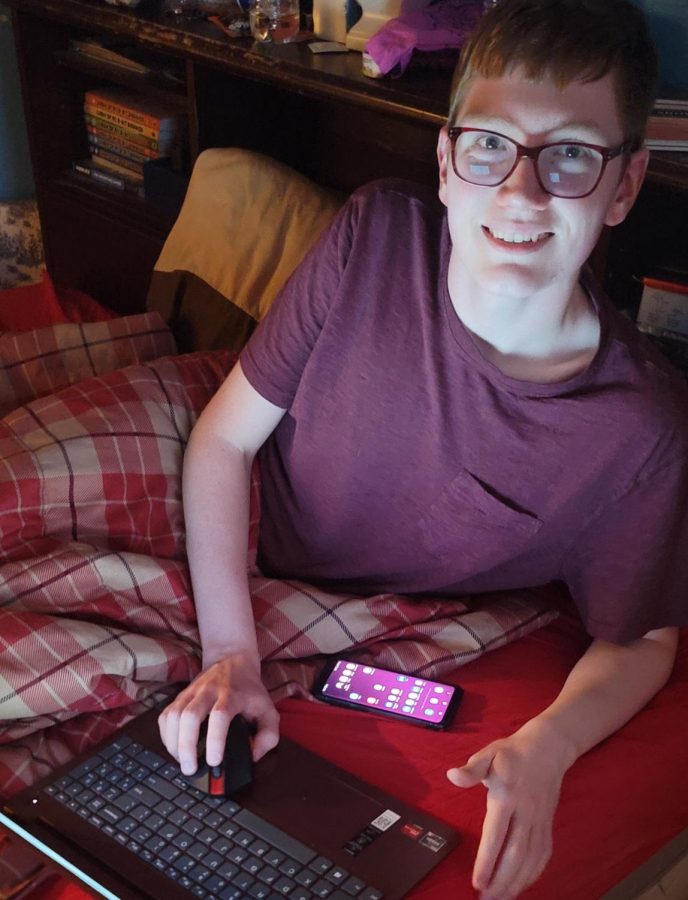Living On The Spectrum: Meet Austin Brigida
Channeling his strengths through creative outlets
Using coding as a creative outlet, senior Austin Brigida lives life with autism spectrum disorder. Brigida found ways to live life just like other students. “I truly believe that Austin is where he is today because of his hard work and the combined efforts of his therapists, teachers and family,” mother Tracy Brigida said.
November 7, 2022
Ever since the age of six, senior Austin Brigida has struggled to communicate with other students. Not being able to put thoughts into words or verbally have a conversation with other people is what he goes through on a daily basis due to autism. But, he has found ways to overcome these obstacles with help from his peers and teachers.
“Autism spectrum disorder (ASD) is a developmental disability caused by differences in the brain. People with ASD may behave, communicate, interact, and learn in ways that are different from most other people,” Tracy Brigida, Austin’s mother, said. “Some people with ASD need a lot of help in their daily lives while others can work and live with little to no support.”
Because of his auditory processing delays and trouble with verbal communication, his early school experiences were not easy.
“Transitioning from middle school to high school wasn’t too difficult, but I had a hard time transitioning from elementary to middle school because I was bullied a bit and didn’t know how to respond appropriately,” Austin said.
When it was time for him to consider his choices for high school, Austin was open to different opportunities.
“My mother encouraged me to apply to SWCTA because she had been a substitute teacher here and knew it was a great school,” Austin said. “I am kind of a foodie so she thought the Culinary program would be good for me and would also give me a skill that I could use to find a job after high school.”
Austin’s first year in high school was a fresh experience that brought along different challenges.
“Freshman year was a little stressful. I had to adjust to moving around campus,” Austin said. “Also, adjusting to the rules in the Culinary program were a little challenging. My IEP (Individualized Educational Plan) team made some adjustments to my accommodations to help me with those challenges and things got better.”
Even with accommodations, Austin can still face challenges with his regular routine.
“Sometimes I struggle to stay on task or complete tasks independently. Also, because of the way my brain processes language, it is difficult for me to respond verbally quickly,” Austin said. “I’ve been aware since age six that I was different because of the amount of therapy I did. I do not talk much and it’s not that I don’t want to. Sometimes I just can’t get my thoughts into words.”
For Austin’s mother raising him has not always been easy.
“When he was very little, I would take him to the park. He would approach other kids to play, but as soon as he didn’t respond verbally or in a manner they expected, they would remove themselves from him,” Tracy said. “I watched it many times and as a mother it breaks your heart to see your kid left out. You want to protect them at every cost and you are hyperaware of every interaction your child has. It can be incredibly difficult and I shed a lot of tears worrying about him.”
It is a common misconception that someone on the autism spectrum is unable to make friends, but Austin is not one of those people.
“I don’t have a hard time making friends,” Austin said. “I have friends at school and online friends that I’ve made while gaming. I’m glad to have friends who are aware of my autism and understand me better than other students.”
Parents of those on the autism spectrum have to consider what life will be like for their child after high school.
“Fewer than 50% of autistic adults are employed and of that 50% many are underemployed or working in positions they are overqualified for,” Tracy said. “Austin is currently working with Nevada Department of Employment, Training and Rehabilitation (DETR) to find employment or job training opportunities for him after he graduates. They also help with learning daily tasks such as driving.”
Currently in the Culinary program, Austin has received help from peers and teachers throughout his time completing the course.
“I do have some fine motor delays due to my autism that make it difficult to manipulate certain tools, but I am able to get help from classmates and teachers when needed,” Austin said. “I’m grateful when people are nice enough to assist me in how to do specific tasks. Life on the spectrum is a daily challenge so anything that makes my day easier is welcome.”
Culinary teacher Michael Hadobas spoke about his experience when teaching Austin.
“In the pandemic, that year was probably the most challenging,” Hadobas said. “I tried to give him as much one-on-one attention as possible, but when we’re in the kitchen, it’s not always possible for me to stay with one student as long as they really need. What I found best is to find people that Austin feels comfortable with and will help him with those smaller skills he needs proficiency in.”
Austin’s parents do their best to help him, besides the help he receives at school.
“His [Austin’s] father and I are very aware and engaged in his education,” Tracy said. “We also try to help him as much as possible by getting him the resources he needs to be successful. His SPED teacher/case worker and the IEP team have been pivotal in his educational success. ”
Just like any other student, Austin also has creative outlets that interest him as well as future aspirations.
“I enjoy coding a lot, especially making video games to play. l prefer coding to sports because I’m not great at them due to my motor skill delays,” Austin said. “After high school, I’d like to pursue a career in the computer science field, either coding or IT. I may work in culinary, but I have become more excited about coding over the last two years, so I’m more interested in computers now.”
As senior year is slowly coming to an end, Austin reminisces on his experiences and those who helped him along the way.
“I am very grateful for the help I get from my teachers and classmates, especially from my aide Leo,” Austin said. “They’ve made my four years here at SWCTA really great. I enjoyed my time here.”








